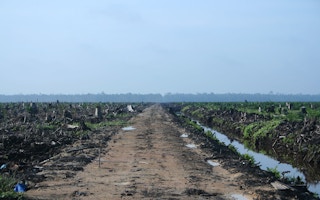As the end of 2020 draws near, so does the deadline for many no-deforestation or No Deforestation, No Peat, No Exploitation (NDPE) commitments by international consumer-facing companies that use palm oil in their products.
To continue reading, subscribe to Eco‑Business.
There's something for everyone. We offer a range of subscription plans.
- Access our stories and receive our Insights Weekly newsletter with the free EB Member plan.
- Unlock unlimited access to our content and archive with EB Circle.
- Publish your content with EB Premium.
These pledges have created a frenzy of activities and initiatives, including multi-stakeholder bodies and, most recently, regulatory initiatives in consumer countries, to mitigate the adverse impacts of a commodity found in about half of products on supermarket shelves.
Given that efforts to produce palm oil responsibly began more than fifteen years ago, companies should be on track to deliver on NDPE commitments made by the Consumer Goods Forum (CGF), an industry network of consumer goods manufacturers and retailers, in 2010.
Unfortunately, this is not the case, and concerted efforts will be needed to achieve this objective within the next two to five years.
Looking back
While some consumer goods firms attempted to achieve their NDPE targets with specific procurement guidelines, most turned to existing platforms like the Roundtable on Sustainable Palm Oil (RSPO), the largest industry standard for palm oil.
However, many non-governmental organisations (NGOs) perceived that the RSPO’s Principles & Criteria (P&C) fell short of delivering NDPE compliance, prompting the creation of the Palm Oil Innovation Group (POIG) in 2013 by Greenpeace, the Rainforest Action Network (RAN), WWF as well as progressive palm oil producers, and more recently consumer goods companies.
POIG developed a standard for responsible palm oil production, which relied in part on the methodology of the High Conservation Stock Approach (HCSA), another multi-stakeholder forum, to address deforestation. Although the POIG Charter remains the most rigorous palm oil standard, its direct commercial impact was limited.
POIG had a significant indirect impact: In its 2018 revision of its principles and criteria, the RSPO incorporated many of the POIG Charter requirements, including the requirement to apply integrated HCV/HCS assessments for new developments.
But while the RSPO principles may deliver NDPE compliance on paper, some NGOs would challenge this conclusion due to documented shortcomings in the RSPO’s assurance systems. That means there may still be an implementation gap for NDPE compliance under the RSPO’s current standards.
What’s missing?
Considering the developments of the RSPO, POIG and available methodologies such as HCSA, companies should be well underway with respect achieving their NDPE commitments. Except they are not.
One bottleneck concerns the availability of RSPO certified palm oil. Only about 19 per cent of global palm oil is certified, and of palm oil that can be traced back to individual certified mills, even less is available. Yet even available supplies of RSPO certified oil are not fully utilised. Reasons for weak uptake include premiums associated with certified palm oil and competing demands from subsidised biofuel markets.
Another reason is that major refining companies—which process palm oil and palm kernel oil and sell various palm oil products to consumer goods companies—obtain their raw materials from hundreds of uncertified mills. These carry unknown non-compliance risks either from their own operations or purchases of raw material from small plantations or independent smallholders.
Although most refiners and traders have made commitments to eliminate NDPE risks from their supply chains, it is unrealistic to expect full NDPE compliance before 2025 or sooner, because it would mean the exclusion of many independent smallholders or small oil mills which currently have no incentives to pay the cost of certification.
An interim measure along the way to full NDPE compliance could be dedicating NDPE oil to selected “green refineries” based on credible and verified criteria to create an incentive for enhanced market uptake. At this point in time, however, none of the big refiners has launched “green refineries”, arguing that buyers are unwilling to carry the financial burden involved in setting up dedicated NDPE supply chains.
This lack of progress has led to a plethora of NDPE requirements—or mill lists—of individual consumer goods companies, which complicate NDPE compliance further. More recently, two initiatives have attempted to consolidate asks and to create a level playing field. The NDPE Integrated Reporting Framework (NDPE-IRF) is a reporting tool to track progress towards NDPE compliance, starting with deforestation and peat. The parties involved in NDPE-IRF are now developing verification procedures and a “no exploitation” component. While there seems to be some involvement of NGOs in NDPE-IRF, public information is scant.
More recently, the CGF under its Forest Positive Coalition of Action has developed a Palm Oil Roadmap, with a series of targets and key performance indicators extending merely through to 2021. The consortium currently comprises 17 consumer goods companies, and reception of this initiative by NGOs has been mixed. At this point in time it is still too early to evaluate the real impact of these efforts. Without doubt, both would benefit from greater transparency.
The landscape angle
So-called landscape approaches have arisen from the realisation that many independent smallholders or even medium-sized plantation companies will likely never become RSPO or POIG certified. Yet, these producers contribute significantly to the supply chains of major global refiners and traders of palm oil products. To reduce costs of certification and maintain inclusiveness of smallholders in international supply chains, approaches such as landscape-level certification or landscape NDPE verification could as such provide assurance that certain landscapes or jurisdictions are “safe”.
The RSPO has attempted to develop jurisdictional certification to accommodate legislative entities encompassing administrative districts, provinces and states. The certification standard is not finalised but has raised questions about the quality of assurance and equity of benefit sharing. The Sustainable Trade Initiative (IDH) is promoting verified sourcing areas and apparently, pilots are underway for several commodities, including one for palm oil in Aceh Tamiang, Indonesia. Likewise, the CGF Forest Positive Coalition of Action has included a landscape component in their Palm Oil Roadmap.
While all these efforts are laudable and worth pursuing, it should be recognised that most landscape or jurisdictional approaches are in a pilot stage and are struggling with similar topics, such as inclusiveness, benefit-sharing, equity, and to what extent sustainability requirements are mandatory and/or enforceable. An additional challenge is to address leakage and ideally multiple commodities, involving and aligning various sectors.
Regulatory frameworks in the making
Acknowledging the failure of voluntary commitments to significantly curb deforestation has led to governments in consumer markets taking a more active role. Recent developments by the European Union (EU) to reduce the deforestation footprint of forest and ecosystem risk commodities (FERC), including palm oil, point towards strict due diligence requirements for companies to minimise risks.
The Burckhardt Report proposes tough penalties for non-compliant companies, EU-based or elsewhere, if they place FERCs or FERC-derived products on the EU market. In October, the EU parliament voted with a strong majority to adopt the report and tasked the European Commission with developing a legal framework. Similar legislation is currently being proposed in the United Kingdom (UK).
Best of both worlds?
It will be interesting to see to what extent the proposed legislation will maintain rigorous draft requirements and how both voluntary and mandatory approaches will complement each other in achieving NDPE compliance. It is unlikely that either approach will unfold its full potential right away. Rather, we will have to wait for fully NDPE-compliant palm oil supply chains until the mid-2020s, and perhaps even longer for other commodities such as soy, beef, or rubber.
Where does this leave consumer goods companies and their customers in the interim? Walking away from palm oil is not the solution, as studies have shown. Large buyers of palm oil products should push for the development of “green refineries” delivering NDPE verified palm oil products as a first step. This would create incentives for refiners and traders to accelerate the transformation of their sourcing. Above all, there is an urgent need for consolidating voluntary initiatives. Having a multitude of NDPE approaches will continue to fragment efforts, dilute potential impacts, and confuse consumers. In addition, regulatory efforts by the EU and the UK should include a dialogue with affected producer countries.
So, even though the end of 2020 will not mark the end of deforestation for palm oil, not all hope is lost. Most supply chain actors are undertaking genuine efforts, which should be applauded. Positive impacts are starting to be reflected in academic reviews. Nevertheless, NGOs need to maintain their watchdog function until NDPE palm oil products become a reality. Finally, consumers should not despair, recognising that substitutes or palm oil may create even worse impacts and that boycotts may reverse the progress that has been made over the past decade.
Matthias Diemer is a sustainability consultant at Switzerland-based consulting firm Diemer Sustainability Consulting.









